CORPORATE ACTION
Paradox Of Lightweighting: When Less Plastic Leads To More Waste
Lightweighing packaging can reduce the total mass of plastic used but without a clear end-use strategy for the redesigned containers and any less- or non-recyclable plastics used in them, the overall plastics problem can be made worse
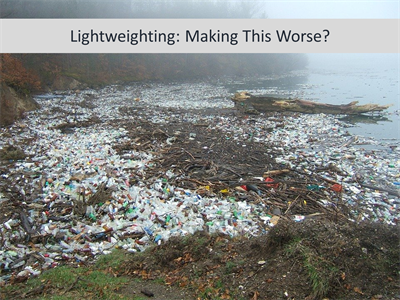 Lightweighting and downgauging plastic packaging has been a focus of CPG companies for at least a decade and many companies tout their achievements in reducing the amount of plastic used.
Lightweighting and downgauging plastic packaging has been a focus of CPG companies for at least a decade and many companies tout their achievements in reducing the amount of plastic used.
Some of the achievements are impressive, and the amount of plastic removed from the supply chain can be large.
Today, a 500ml plastic Coca-Cola bottle weighs 19.9g, almost 10g lighter than in 2008.
Coca-Cola Company says that packaging accounts for 41% of its total carbon footprint, but lightweighting, and promoting recycled content, reduced it by 14.2% since 2010.
Lightweighting remains a focus for the company. It talks of “Working to remove all unnecessary or hard-to-recycle plastic from its portfolio, through lightweighting and the removal of all secondary packaging made from plastic.” (Interesting use of ‘unnecessary’).
Nestle, in the last decade, reduced by 22% the quantity of PET needed for each liter of bottled water. Lightweighting is a key part of the company’s eco-design process that helped it avoid the use of some 142,000 metric tons of packaging materials by the end of 2019, against a baseline of 2015.
Unilever used injection compression technology in 2015 to cut plastic use in some of its food tubs in Europe, saving around 21 tonnes of plastic in 2017. It also combined a thinner polyethylene layer with a stronger polymer in some of its Home Care brands' flexible packaging, such as sachets and pouches, and reduced polymer use by 1,400 tonnes in 2017.
There are many other examples of substantial plastic waste savings.
Reducing pack weight also brings gains through the supply chain in reduced transport costs, lowering the carbon footprint overall. Clearly the benefits of lightweighting can be significant, and on the surface, it all looks positive.
Unintended Consequences
However, as companies pursue individual goals without regard to the overall impact of their actions the full impact of lightweighting is much more nuanced.
Hurting Recycling
Lightweighting makes recycling less economic. Decreasing the bulk of plastic available makes processing collected waste more costly and yields lower plastic to recycle. Recycling is already struggling to be viable and this shift increases the chance the plastic will head to landfill or the ocean.
Also, the two plastics most commonly targeted for lightweighting are PET (soda bottles, shampoo and much more) and HDPE (laundry detergents, bleach and more), which are amongst the easiest to recycle. Removing these from the pool of plastic waste makes the challenge of recycling even greater.
Thinner plastic is mostly weaker and brings the temptation to create smaller pack sizes. These can be more convenient for consumers but bring the risk that more items of thin plastic will be discarded, all of which are too thin to be recycled
Introducing Non-Recyclable Plastic
Some packaging redesigns replace rigid or firm plastic with a flexible plastic that is less bulky. This happens commonly for refill containers such as for hand soap, or with use of single-serve sachets. Overall plastic bulk falls and it looks like a good outcome. However, flexible plastics are usually multi-layered composites that are very hard to recycle, if at all. The net result is that recyclable plastic is replaced with plastic that has to go to landfill.
Fragmenting Faster
When lighter packaging enters the environment, it breaks down into smaller pieces more quickly than packaging that is thicker and stronger. Research is starting to show the damage that microplastics can bring, especially as they are fragmented into nanoplastics that can pass through cell walls, potentially interfering with cell metabolism and introducing toxins.
A Focus On Bulk
McKinsey points out how companies are mostly focused on lightweighting/downgauging and other internal changes such as improving energy efficiency and waste reduction.
Using less has its place, but unfortunately it’s too often being achieved by using plastics that bring greater harm. Companies need to think through the end-use of replacement plastics. Without this holistic view their actions can look good for them but compound and cause additional problems.
The Wrong End Of The Stick
There’s a cultural issue too. By lightweighting, companies can point to progress made in reducing the amount of single-use plastic they use. They edge toward reduction targets and can stick with a business model that has served them for decades. It merely permissions them to keep polluting, albeit a different way. The real challenge is to move to refill solutions that will genuinely solve the plastics crisis rather than tinker around the ends to prolong single-use plastic as an acceptable business model.[Image Credit: © geraldsimon00]
 Lightweighting and downgauging plastic packaging has been a focus of CPG companies for at least a decade and many companies tout their achievements in reducing the amount of plastic used.
Lightweighting and downgauging plastic packaging has been a focus of CPG companies for at least a decade and many companies tout their achievements in reducing the amount of plastic used.Some of the achievements are impressive, and the amount of plastic removed from the supply chain can be large.
Today, a 500ml plastic Coca-Cola bottle weighs 19.9g, almost 10g lighter than in 2008.
Coca-Cola Company says that packaging accounts for 41% of its total carbon footprint, but lightweighting, and promoting recycled content, reduced it by 14.2% since 2010.
Lightweighting remains a focus for the company. It talks of “Working to remove all unnecessary or hard-to-recycle plastic from its portfolio, through lightweighting and the removal of all secondary packaging made from plastic.” (Interesting use of ‘unnecessary’).
Nestle, in the last decade, reduced by 22% the quantity of PET needed for each liter of bottled water. Lightweighting is a key part of the company’s eco-design process that helped it avoid the use of some 142,000 metric tons of packaging materials by the end of 2019, against a baseline of 2015.
Unilever used injection compression technology in 2015 to cut plastic use in some of its food tubs in Europe, saving around 21 tonnes of plastic in 2017. It also combined a thinner polyethylene layer with a stronger polymer in some of its Home Care brands' flexible packaging, such as sachets and pouches, and reduced polymer use by 1,400 tonnes in 2017.
There are many other examples of substantial plastic waste savings.
Reducing pack weight also brings gains through the supply chain in reduced transport costs, lowering the carbon footprint overall. Clearly the benefits of lightweighting can be significant, and on the surface, it all looks positive.
Unintended Consequences
However, as companies pursue individual goals without regard to the overall impact of their actions the full impact of lightweighting is much more nuanced.
Hurting Recycling
Lightweighting makes recycling less economic. Decreasing the bulk of plastic available makes processing collected waste more costly and yields lower plastic to recycle. Recycling is already struggling to be viable and this shift increases the chance the plastic will head to landfill or the ocean.
Also, the two plastics most commonly targeted for lightweighting are PET (soda bottles, shampoo and much more) and HDPE (laundry detergents, bleach and more), which are amongst the easiest to recycle. Removing these from the pool of plastic waste makes the challenge of recycling even greater.
Thinner plastic is mostly weaker and brings the temptation to create smaller pack sizes. These can be more convenient for consumers but bring the risk that more items of thin plastic will be discarded, all of which are too thin to be recycled
Introducing Non-Recyclable Plastic
Some packaging redesigns replace rigid or firm plastic with a flexible plastic that is less bulky. This happens commonly for refill containers such as for hand soap, or with use of single-serve sachets. Overall plastic bulk falls and it looks like a good outcome. However, flexible plastics are usually multi-layered composites that are very hard to recycle, if at all. The net result is that recyclable plastic is replaced with plastic that has to go to landfill.
Fragmenting Faster
When lighter packaging enters the environment, it breaks down into smaller pieces more quickly than packaging that is thicker and stronger. Research is starting to show the damage that microplastics can bring, especially as they are fragmented into nanoplastics that can pass through cell walls, potentially interfering with cell metabolism and introducing toxins.
A Focus On Bulk
McKinsey points out how companies are mostly focused on lightweighting/downgauging and other internal changes such as improving energy efficiency and waste reduction.
Using less has its place, but unfortunately it’s too often being achieved by using plastics that bring greater harm. Companies need to think through the end-use of replacement plastics. Without this holistic view their actions can look good for them but compound and cause additional problems.
The Wrong End Of The Stick
There’s a cultural issue too. By lightweighting, companies can point to progress made in reducing the amount of single-use plastic they use. They edge toward reduction targets and can stick with a business model that has served them for decades. It merely permissions them to keep polluting, albeit a different way. The real challenge is to move to refill solutions that will genuinely solve the plastics crisis rather than tinker around the ends to prolong single-use plastic as an acceptable business model.[Image Credit: © geraldsimon00]
CORPORATE ACTION: Coca-Cola
Coca-Cola European Partners Introduces CanCollar To Lower Single-Use Plastic
 Coca-Cola European Partners will introduce the CanCollar paperboard packaging solution for multipack cans in Spain. CCEP says the change is part of its efforts to remove hard-to-recycle plastic from its product line and claims CanCollar will help save more than 11,000 tonnes of virgin plastic across Western Europe every year. CanCollar has been certified by the Programme for the Endorsement of Forest Certification and CCEP says it will launch it in November 2020 in Spain’s Balearic Islands. Part of Coca-Cola’s World Without Waste program, the CanCollar initiative has received €2.6 million in investment by CCEP and is developed in partnership with packaging company WestRock.[Image Credit: © Coca-Cola European Partners]
Coca-Cola European Partners will introduce the CanCollar paperboard packaging solution for multipack cans in Spain. CCEP says the change is part of its efforts to remove hard-to-recycle plastic from its product line and claims CanCollar will help save more than 11,000 tonnes of virgin plastic across Western Europe every year. CanCollar has been certified by the Programme for the Endorsement of Forest Certification and CCEP says it will launch it in November 2020 in Spain’s Balearic Islands. Part of Coca-Cola’s World Without Waste program, the CanCollar initiative has received €2.6 million in investment by CCEP and is developed in partnership with packaging company WestRock.[Image Credit: © Coca-Cola European Partners]
Coca-Cola European Partners Outlines Path To 100% RPET
 According to Coca-Cola European Partners, removing virgin, petroleum-based PET from food-grade packaging is a core requirement for achieving 100% recycled PET, or rPET. It will also play an important role in managing growing CO2 emissions, as well as in addressing the loss of material value that occurs in a non-circular system.
According to Coca-Cola European Partners, removing virgin, petroleum-based PET from food-grade packaging is a core requirement for achieving 100% recycled PET, or rPET. It will also play an important role in managing growing CO2 emissions, as well as in addressing the loss of material value that occurs in a non-circular system.To create a fully closed loop for PET packaging, CCEP says the plastic recycling sector needs to achieve a number of things. First, existing waste collection services must be improved. EU governments should continue to speed up plans for national collection systems that encourage consumers to participate. Next, sorting and mechanical recycling capacity should be increased. Of the 4.3 million tonnes of food-grade PET produced in the EU per year, only 30% is mechanically recycled.
At present, there is not enough food-grade rPET available in the market. In time, adoption of depolymerization recycling technology will improve current mechanical polymer recycling processes and upcycle lower-grade PET, boosting supply of rPET. CCEP says that while Covid-19 has brought a number of social and economic challenges, it also offers an opportunity to revise existing systems and create a circular economy for packaging.[Image Credit: © Coca-Cola European Partners]
CORPORATE ACTION: Henkel
RB And Yoyo Team Up For A HDPE Recycling Pilot In France
 RB indicated that challenges to achieving a circular economy for plastics include effective infrastructure and consumer participation, and it needs to meet the challenge “one country at a time”. In France, where less than 30% of household plastic is recycled, it has announced a partnership between its Vanish brand and Yoyo, which aims to improve recycling rates, especially for PET, through community action. It delivers recycling bags in which households put plastic waste for sorting and recycling. It has proved popular for PET bottles and Vanish hopes to get similar success for its HDPE packaging. RB has bought pink Yoyo bags for distributing in a pilot project to over 500 homes in Lyon. RB is offering products and other rewards to encourage participation.[Image Credit: © RB]
RB indicated that challenges to achieving a circular economy for plastics include effective infrastructure and consumer participation, and it needs to meet the challenge “one country at a time”. In France, where less than 30% of household plastic is recycled, it has announced a partnership between its Vanish brand and Yoyo, which aims to improve recycling rates, especially for PET, through community action. It delivers recycling bags in which households put plastic waste for sorting and recycling. It has proved popular for PET bottles and Vanish hopes to get similar success for its HDPE packaging. RB has bought pink Yoyo bags for distributing in a pilot project to over 500 homes in Lyon. RB is offering products and other rewards to encourage participation.[Image Credit: © RB]
Henkel To Launch Recyclable Toothpaste Tube
 Conventional toothpaste tubes are not recyclable because of their multi-layer construction, but Henkel, in partnership with Albéa, has developed a fully-recyclable HDPE (including the cap) tube and will transition its entire oral care portfolio to it early 2021, beginning with the Licor del Polo brand in Spain. Packaging supplier Albéa’s tube technology, Greenleaf, is recognized by the Association of Plastic Recyclers in the US and Suez.Circpack in Europe as technically recyclable. Henkel says the move will cover over 700 tons of packaging per year.[Image Credit: © Henkel]
Conventional toothpaste tubes are not recyclable because of their multi-layer construction, but Henkel, in partnership with Albéa, has developed a fully-recyclable HDPE (including the cap) tube and will transition its entire oral care portfolio to it early 2021, beginning with the Licor del Polo brand in Spain. Packaging supplier Albéa’s tube technology, Greenleaf, is recognized by the Association of Plastic Recyclers in the US and Suez.Circpack in Europe as technically recyclable. Henkel says the move will cover over 700 tons of packaging per year.[Image Credit: © Henkel]
Henkel Upgrades Tool To Assess Sustainability Of Packaging
 Henkel upgraded its online tool, EasyD4R, for evaluating the recyclability of packaging. The tool was released last year to help developers quickly and accurately assess the recyclability of packaging during early stages of product development. EasyD4R now also allows users to quickly and accurately assess the recyclability of packaging made of paper/cardboard, glass, aluminum and tinplate.
Henkel upgraded its online tool, EasyD4R, for evaluating the recyclability of packaging. The tool was released last year to help developers quickly and accurately assess the recyclability of packaging during early stages of product development. EasyD4R now also allows users to quickly and accurately assess the recyclability of packaging made of paper/cardboard, glass, aluminum and tinplate.
CORPORATE ACTION: Nestlé
Nestlé Waters NA Says Three More Spring Water Brands Will Be rPET-Packaged
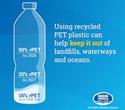 The Stamford, Conn.-based bottled water company announced that three more of its U.S. still water brands are converting to 100 percent recycled plastic bottles. Though 100 percent recyclable for some time, Ozarka Spring Water, Deer Park, and Zephyrhills bottles will now be made from 100 percent recycled plastic. With the expansion of recycled plastic (rPET) to these brands, nearly 60 percent of all households in the U.S. will have access to a Nestlé Waters regionally distributed spring water brand in bottles made entirely of recycled plastic. All three will include a message on the labels of the 20-ounce, 700 ml, one liter, and 1.5 liter bottles, stating they are both 100 percent recyclable and made from 100 percent recycled plastic. [Image Credit: © Nestlé]
The Stamford, Conn.-based bottled water company announced that three more of its U.S. still water brands are converting to 100 percent recycled plastic bottles. Though 100 percent recyclable for some time, Ozarka Spring Water, Deer Park, and Zephyrhills bottles will now be made from 100 percent recycled plastic. With the expansion of recycled plastic (rPET) to these brands, nearly 60 percent of all households in the U.S. will have access to a Nestlé Waters regionally distributed spring water brand in bottles made entirely of recycled plastic. All three will include a message on the labels of the 20-ounce, 700 ml, one liter, and 1.5 liter bottles, stating they are both 100 percent recyclable and made from 100 percent recycled plastic. [Image Credit: © Nestlé]
CORPORATE ACTION: Procter & Gamble
Olay To Trial Refillable Pods With Regenerist Whip Moisturiser In UK
 Procter & Gamble’s beauty brand Olay plans to test-market its best-selling Regenerist Whip line of moisturizers in a refillable pod packaging in the UK. During the trial, exclusively on Amazon.co.uk, Olay Regenerist Whip will be priced at £38.50 and include a full jar of the moisturizer and a refill pod for the empty jar. According to P&G, the packaging format could help reduce plastic jar waste in the beauty industry by 94%. Olay will donate £5 for every sale of Olay Refills to its charity partner, Young Women’s Trust.[Image Credit: © Amazon]
Procter & Gamble’s beauty brand Olay plans to test-market its best-selling Regenerist Whip line of moisturizers in a refillable pod packaging in the UK. During the trial, exclusively on Amazon.co.uk, Olay Regenerist Whip will be priced at £38.50 and include a full jar of the moisturizer and a refill pod for the empty jar. According to P&G, the packaging format could help reduce plastic jar waste in the beauty industry by 94%. Olay will donate £5 for every sale of Olay Refills to its charity partner, Young Women’s Trust.[Image Credit: © Amazon]
CORPORATE ACTION: Unilever
Unilever’s Magnum Launches New Tubs Made With Recycled Plastic
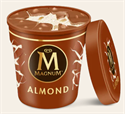 Magnum has launched new tubs and lids that are fully recyclable and made with recycled polypropylene plastic (rPP), for its Pints line of ice cream. Unilever worked with SABIC to develop an rPP solution suitable for food-grade use. Introduced in 2019 and designed to convert formerly unrecyclable plastic waste into reusable resin, the rPP tubs and lids can be recycled in a closed-loop that preserves packaging quality and reduces the need for virgin plastic. First launched in Belgium, the Netherlands, and Spain in 2019 with 600,000 new tubs, more than 7 million will be introduced in other European countries in 2020. According to the company, all Magnum Pints tubs in Europe will be made with rPP by the end of 2020.[Image Credit: © Unilever plc]
Magnum has launched new tubs and lids that are fully recyclable and made with recycled polypropylene plastic (rPP), for its Pints line of ice cream. Unilever worked with SABIC to develop an rPP solution suitable for food-grade use. Introduced in 2019 and designed to convert formerly unrecyclable plastic waste into reusable resin, the rPP tubs and lids can be recycled in a closed-loop that preserves packaging quality and reduces the need for virgin plastic. First launched in Belgium, the Netherlands, and Spain in 2019 with 600,000 new tubs, more than 7 million will be introduced in other European countries in 2020. According to the company, all Magnum Pints tubs in Europe will be made with rPP by the end of 2020.[Image Credit: © Unilever plc]
CORPORATE ACTION: Other
Brightmark Pushes Plastic Waste Solution, Mostly Seeing It As Fuel For Incineration
At present, the company’s first plastics recycling plant, located in northeast Indiana, is in testing and is expected to be in production by early 2021. Meanwhile, the company is close to selecting locations for its next recycling plants in states, including Florida, Georgia, and New York.[Image Credit: © Brightmark]
MARKET NEWS
smol Secures €8.8 million To Expand Home-Delivery Of Plastic Free Washing Detergent
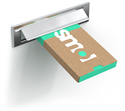 UK-Based smol sells a line of eco detergent and other products that it mails direct to consumers. It claims to have delivered to over a quarter of a million household and just completed a Series A funding totaling €8.8 million.
UK-Based smol sells a line of eco detergent and other products that it mails direct to consumers. It claims to have delivered to over a quarter of a million household and just completed a Series A funding totaling €8.8 million.smol, which is available in the UK, Germany and France, says interest has tripled since coronavirus and it’s one of the fastest growing laundry brands, used in 1.5 million washes a week.
In addition to laundry capsules, smol offers concentrated fabric conditioner, and dishwasher tablets.[Image Credit: © smol]
PACKAGING REDESIGNS
Beauty Brands Experiment With Refill Solutions
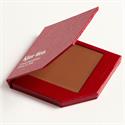 Beauty brands are testing refillable products as a means to reduce plastic use in packaging and lessen its impact on the environment. Roughly modeled from the traditional milkman or India’s dabbawalas concept, refillable products promise significant environmental benefits, including dealing with the limits of plastics recycling. Consumers can refill products in various ways, including in-store, via subscription, or a circular program, such as TerraCycle’s Loop. Unilever’s skin-care brand REN, for example, developed a refillable system for six of its bestselling products, including body wash and lotion for use on Loop. REN says Loop is a more sustainable refill option than the sachet refill approach adopted by other brands, including NatureLab Tokyo and L’Occitane. However, early adopters of refillable products face some big obstacles, notably higher prices. To deal with this issue, beauty brand Kjaer Weis launched in May 2020 a red paper packaging system that is both recyclable and compostable. Products with the red packaging cost 25% less than those with the original packaging, with refills costing 40-50 percent less.[Image Credit: © Kjaer Weis]
Beauty brands are testing refillable products as a means to reduce plastic use in packaging and lessen its impact on the environment. Roughly modeled from the traditional milkman or India’s dabbawalas concept, refillable products promise significant environmental benefits, including dealing with the limits of plastics recycling. Consumers can refill products in various ways, including in-store, via subscription, or a circular program, such as TerraCycle’s Loop. Unilever’s skin-care brand REN, for example, developed a refillable system for six of its bestselling products, including body wash and lotion for use on Loop. REN says Loop is a more sustainable refill option than the sachet refill approach adopted by other brands, including NatureLab Tokyo and L’Occitane. However, early adopters of refillable products face some big obstacles, notably higher prices. To deal with this issue, beauty brand Kjaer Weis launched in May 2020 a red paper packaging system that is both recyclable and compostable. Products with the red packaging cost 25% less than those with the original packaging, with refills costing 40-50 percent less.[Image Credit: © Kjaer Weis]
TUBES Promote Resuable Single-Serve Containers For Alcohol
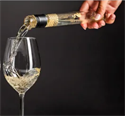 TUBES from The Netherlands offers tubular single-serve packaging for wines, cocktails, and spirits. Available in 50-ml and 100-ml tubes, and made of glass or recycled PET, the packaging provides a number of benefits, such as reduced product wastage, weight, and required space during distribution. For the retail sector, the tubes work as a direct-tasting marketing tool, while for the travel market, the tubes offer a sustainable single-serve packaging which offers space savings of 127% more tubes in a container and 40% less weight. Single-serve items also avoid the need to share a bottle. Customizable based on types of beverages and branding, the regular tubes are clear; however, colored glass or recycled plastic can be used for high-volume. [Image Credit: © TUBES]
TUBES from The Netherlands offers tubular single-serve packaging for wines, cocktails, and spirits. Available in 50-ml and 100-ml tubes, and made of glass or recycled PET, the packaging provides a number of benefits, such as reduced product wastage, weight, and required space during distribution. For the retail sector, the tubes work as a direct-tasting marketing tool, while for the travel market, the tubes offer a sustainable single-serve packaging which offers space savings of 127% more tubes in a container and 40% less weight. Single-serve items also avoid the need to share a bottle. Customizable based on types of beverages and branding, the regular tubes are clear; however, colored glass or recycled plastic can be used for high-volume. [Image Credit: © TUBES]
POLICY, REGULATION & LEGAL
New Plastic Waste Levy In The EU From January 2021
 Seeking to offset some of the cost of its COVID-19 recovery package, the EU is introducing a plastic waste tax from next January at a “call rate” of €0.80/kg. Environmental groups have welcomed the move as a step towards a circular economy, although Environmental Action Germany said the move was “too timid” and late. The levy will be imposed nationally and paid to the EU.[Image Credit: © European Union]
Seeking to offset some of the cost of its COVID-19 recovery package, the EU is introducing a plastic waste tax from next January at a “call rate” of €0.80/kg. Environmental groups have welcomed the move as a step towards a circular economy, although Environmental Action Germany said the move was “too timid” and late. The levy will be imposed nationally and paid to the EU.[Image Credit: © European Union]
INNOVATION & TECHNOLOGY
Finalists For Packaging Europe’s 2020 Sustainability Awards Announced
- Driving the Circular Economy (including from P&G (Belgium), Ariel liquid detergents bottles with 50% rHDPE)
- Recyclable Packaging
- Resource Efficiency
- Best Practice (including from Henkel (Germany) its EasyD4R tool to evaluate recyclability of packaging)
- Machinery
- Bio-Based Packaging
- Pre-Commercialised Innovation
Coca-Cola, Danone Partner Avantium Has Developed Plant-Based Potential PET Alternative
 Plant-based plastics company Avantium claims the product is fully recyclable and has carbon footprint of under half of petroleum-based plastic. The company’s YXY technology uses fructose syrup and converts it to polyethylene furanoate (PEF), and it lists companies like Coca-Cola and Danone as partners. Avantium says PEF could be an alternative to oil-based PET, which uses fossil fuels. Avantium claims to have overcome obstacles like the green tinge in its earlier attempts at producing PEF, and says its PEF is a superior barrier to PET against oxygen, water and CO2, which could provide a longer shelf-life for beverages. Avantium claims PEF can be adequately recycled many times, or it will degrade naturally in landfill, and in a few years in the wider environment. The company still needs to prove it can produce PEF at scale, from its plant in the north of the Netherlands.[Image Credit: © Avantium ]
Plant-based plastics company Avantium claims the product is fully recyclable and has carbon footprint of under half of petroleum-based plastic. The company’s YXY technology uses fructose syrup and converts it to polyethylene furanoate (PEF), and it lists companies like Coca-Cola and Danone as partners. Avantium says PEF could be an alternative to oil-based PET, which uses fossil fuels. Avantium claims to have overcome obstacles like the green tinge in its earlier attempts at producing PEF, and says its PEF is a superior barrier to PET against oxygen, water and CO2, which could provide a longer shelf-life for beverages. Avantium claims PEF can be adequately recycled many times, or it will degrade naturally in landfill, and in a few years in the wider environment. The company still needs to prove it can produce PEF at scale, from its plant in the north of the Netherlands.[Image Credit: © Avantium ]
EMERGING IDEAS, THEMES & TRENDS
UK Household Plastic Waste Increased Under Lockdown
 Household plastic waste increased during the COVID-19 lockdown period in the UK, according to the Everyday Plastic Survey. Results of the study, which included 483 participants from 176 households, revealed fruit and vegetable packaging accounted for 22% of the 22,891 pieces of plastic collected, recorded, and analyzed. Plastics used to wrap, package, or consume food and drink accounted for 68%, while 65% of the items were made of soft, thin, and flimsy plastic. Also, 63% of the collected plastic waste are not collected for recycling by councils, the group said.[Image Credit: © Everyday Plastic]
Household plastic waste increased during the COVID-19 lockdown period in the UK, according to the Everyday Plastic Survey. Results of the study, which included 483 participants from 176 households, revealed fruit and vegetable packaging accounted for 22% of the 22,891 pieces of plastic collected, recorded, and analyzed. Plastics used to wrap, package, or consume food and drink accounted for 68%, while 65% of the items were made of soft, thin, and flimsy plastic. Also, 63% of the collected plastic waste are not collected for recycling by councils, the group said.[Image Credit: © Everyday Plastic]
EMF Release New Circular Design Toolkit, Highlighting Importance Of Design
Algramõ Finds Traction With Mobile Refill Model
A recent innovation is to RFID-tag containers, so the container is linked to the consumer’s account. Usage is tied to the amount of plastic avoided and feeds into a loyalty discount of 11.5% per liter. The company says that reusing containers makes the product 30% cheaper than using non-returnable packaging.[Image Credit: © Algramo]
RESEARCH
Research Shows Levels Of Microplastic In Seafood
 Researchers from the University of Queensland (Australia) measured microplastic contamination levels in samples of common seafood, including prawns, oysters, and crabs. To report findings the team developed a new mass measurement unit suitable for seafood and found varying microplastic concentrations in different species, with 0.04mgs in squid; 0.07mgs in prawns; 0.1mg in oysters; 0.3mgs in crabs; and 2.9mgs in sardines. The findings are a step toward understanding possible harm microplastic in seafood could cause humans. Research will move forward to focus on the source of the plastic found in seafood.[Image Credit: © University of Queensland]
Researchers from the University of Queensland (Australia) measured microplastic contamination levels in samples of common seafood, including prawns, oysters, and crabs. To report findings the team developed a new mass measurement unit suitable for seafood and found varying microplastic concentrations in different species, with 0.04mgs in squid; 0.07mgs in prawns; 0.1mg in oysters; 0.3mgs in crabs; and 2.9mgs in sardines. The findings are a step toward understanding possible harm microplastic in seafood could cause humans. Research will move forward to focus on the source of the plastic found in seafood.[Image Credit: © University of Queensland]
Study Shows Small Crustacean Can Rapidly Fragment Microplastics, Raising Concerns
 A University College Cork (Ireland) study found that the 2cm-long amphipod, Gammarus duebeni, can fragment microplastic beads into nanoplastics in four days. This is a concern since nanoplastics (less than one micron, or one thousandth of a millimeter) are small enough to pass through cell membranes, unlike microplastic (which can be up to 5mm). Researchers believe nanoplastics may be able to interfere with cell function or act as carriers for toxins.
A University College Cork (Ireland) study found that the 2cm-long amphipod, Gammarus duebeni, can fragment microplastic beads into nanoplastics in four days. This is a concern since nanoplastics (less than one micron, or one thousandth of a millimeter) are small enough to pass through cell membranes, unlike microplastic (which can be up to 5mm). Researchers believe nanoplastics may be able to interfere with cell function or act as carriers for toxins.This finding may also shed light on the fate of microplastics. By some estimates, 99% of plastic waste entering oceans goes ‘missing’, and perhaps digestive fragmentation reduces it to below a detectable level but to a size that increases its potential danger.[Image Credit: © Michal Maňas]
New Report Paints A Stark Picture Of Ocean Plastic Waste By 2040
It put forward 10 critical findings, but probably the starkest conclusion was that the annual flow will triple by 2040 without action, creating problems for communities, ecosystems, and businesses, at a cost of US$100 billion annually.
It admits that steps are being taking by governments and industry, but they are not enough, and will have only a relatively small impact.
There is no single solution, but concerted and integrated action is required across platforms, both upstream and downstream. It finds that no single solution would return annual leakage levels to even 2016 levels by 2040.
It also concludes that solutions exist. Missing are adequate regulatory frameworks, business models, and funding. It believes that the reduction in plastic production (via elimination, consumer reuse and new delivery models) is the best approach, but to achieve near-zero ocean plastic pollution, we will need technological development, much more investment, new business models, and accelerated upstream innovation.
Cutting around 80% of plastic leakage into oceans would create a new circular plastics economy alive with strong opportunities. Currently, plastic producers are at risk from plastic pollution through regulatory changes and consumer anger. Forward-looking companies would, therefore, prepare to move ahead of the curve by taking value from the opportunities offered by a circular economy.
Addressing plastic leakage will also create broader benefits, for climate change, employment, health and the environment more widely.
It wraps up its conclusions by stressing that there should be no delay: a five-year implementation pause would see some 80 million additional metric tons of plastic flowing into oceans by 2040.[Image Credit: © Pew Trust]
Copyright 2026 Business360, Inc.

